Mathematics
Mathematics Department
|
Mathematics Department |
||
|---|---|---|
|
HOD (Mathematics) |
Miss Jau Hsiao Chien |
jau_hsiao_chien@schools.gov.sg |
|
Level Head (Mathematics) |
Mr Tan Kian Tiong |
tan_kian_tiong@schools.gov.sg |
|
Level Head (Mathematics) |
Mdm Jesslyn Goh |
goh_jielin_jesslyn@schools.gov.sg |
VISION
Innovative Problem-solvers, Creative Thinkers
MISSION
Developing lifelong learning with a passion for Mathematics.
DESIRED OUTCOMES
In Rosyth School, we aim to nurture Rosythians who are able to think logically, abstractly, critically, creatively and innovatively.
Through Rosyth Signature Programmes and Rosyth Learning Experiences, we develop Rosythians’ metacognition, as well as their appreciation for the beauty and depth of Mathematics. Rosythians are also given opportunities and platforms to extend and apply their learning of Mathematics.
Rosyth Signature Programmes:
-
STAR approach to problem-solving
-
Rosyth Learning Experiences
- Differentiated Instructions
- Learning Centres
- Formative Assessment
- Open-ended Tasks
- Gamification
SIGNATURE PROGRAMMES
STAR approach to problem-solving (P1 – P6)
In Rosyth School, we have a structured approach for teaching heuristics and problem- solving skills. STAR is the acronym for this structured approach.
-
S – Study the Problem
-
T – Think of a plan
-
A – Act on the plan
-
R – Reflect on your own answer
Rosythians’ Learning Experiences
Differentiated Instructions (DI):
All students have the same learning goal. In Rosyth School, our teachers
have developed a series of DI lessons to meet the diverse learning needs
of our students in order to maximise their progress in learning; these
lessons vary based on students’ interests, preferences, strengths, and
struggles.

Learning Centres (P1 and P2):
Learning Centre is a method of instruction in which small groups of students
move through many learning centers, or stations, allowing teachers to differentiate
instruction by incorporating students’ needs, interests, and learning styles.
This involves group work whereby our students have the opportunities to
apply their learning and demonstrate their thinking skills aloud to their
peers.
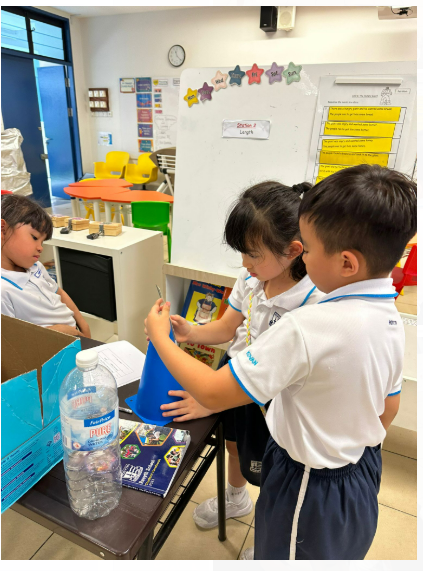
Formative Assessment:
The Mathematics department makes use of Formative Assessment (FA) to discover
what our students know while they’re still in the process of learning it.
FA is a planned, ongoing process used by all students and teachers during learning and teaching to elicit and use evidence of student learning to improve student understanding of intended disciplinary learning outcomes and support students to become self-directed learners.
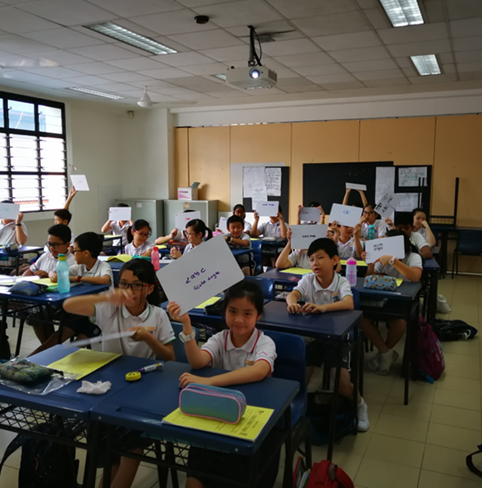
Teachers make use of tools like the Mini Whiteboard. The mini whiteboard allows teachers to assess students on their knowledge of the topics and their ability to perform procedural skills in mathematics. The feedback gained would be used by teachers to determine if the class is ready to move on to more challenging tasks.
One of the main strategies used in FA is “Find the errors and fix them”.
Our students are provided with solutions, both right and wrong to evaluate. They would comment on the mistakes made, the organization of the solutions and misconception. This allows our students to be more reflective learners and understand the concepts taught better.
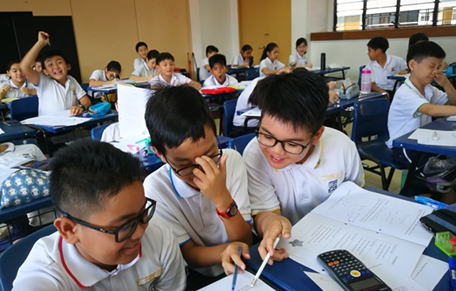
“If you learned it, help someone who hasn’t” is another strategy that teachers use to guide their students to be self-directed learners.
Students are encouraged to share their learning with their friends and point out key words/ phrases which help them to identify the concepts and methods to use in problem solving. Through teaching and learning from their peers, our students are able to understand the concepts and strategies better.
Open-ended Tasks:
Learning Mathematics with open-ended tasks is an important experience
that our students undergo in Rosyth School. Such tasks are open, i.e. there
is no one fixed answer (many possible answers). They can be solved in different
ways and on different levels (accessible to mixed abilities). These open-ended
tasks empower our Rosythians to make their own mathematical decisions and
make room for their own mathematical thinking. These enable them to further
develop reasoning and communication skills, which is an important competency
in the 21st century. For example, the Primary 4 students have to take on
the role of an Urban Planner, plan its land usage for a particular plot
of land, and come up with all the possible dimensions of the rectangular
plot of land and calculate the cost of fencing, based on the type of fencing!
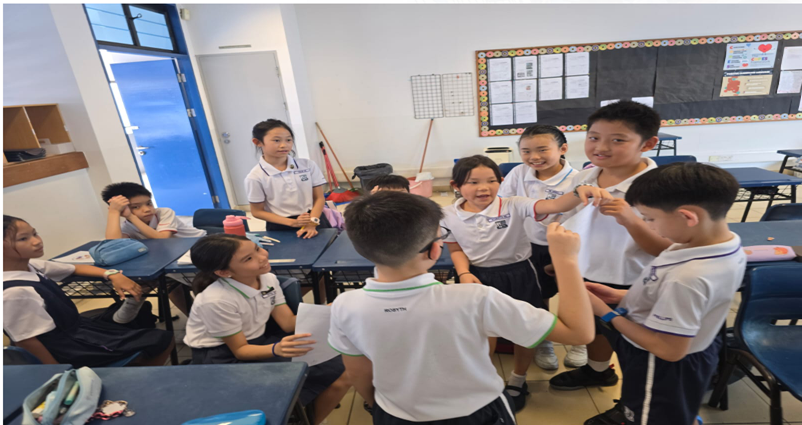
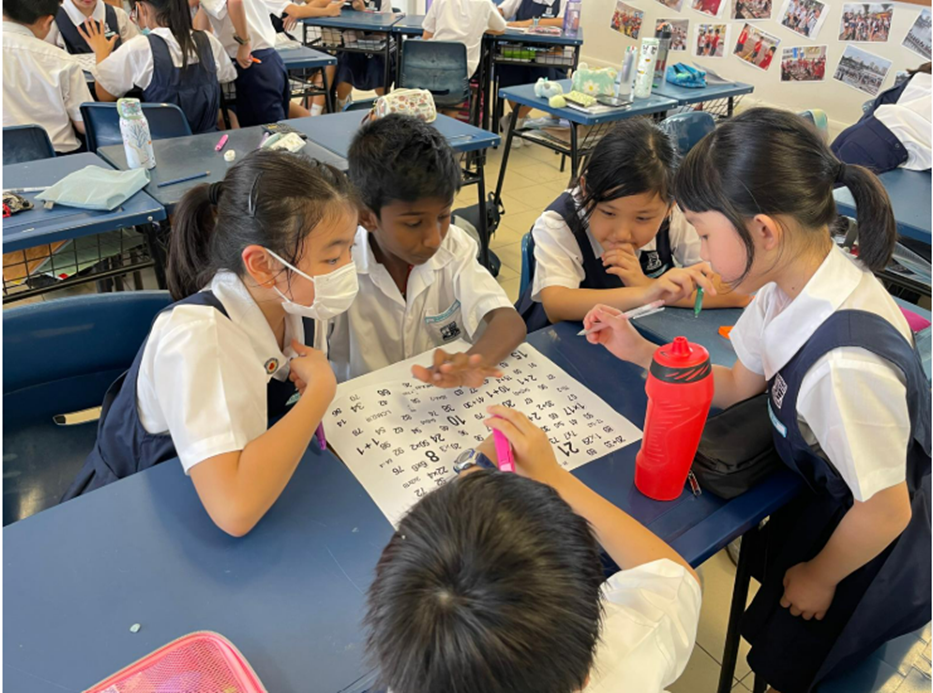
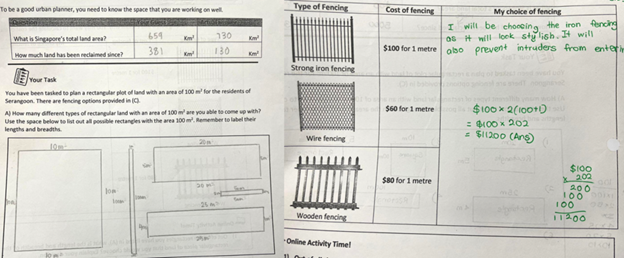
Gamification:
Motivation is one of the core benefits of game-based learning. It tends
to be increased, as games are naturally thrilling and successful in keeping
the players hooked. Our Math department uses gamification to get our students
to arrive at that “high joy, high learning” state, so that they are engaged
and be able to apply what they have learnt. We have created online escape
rooms in SLS and physical escape rooms for our students to apply what they
have learnt in Mathematics.
Rosyth Learning Support Programme for Mathematics
The programme provides early intervention so that pupils will have a good foundation in Mathematics. The focus is on equipping pupils with basic mathematical skills and concepts. It aims to build pupils’ confidence and positive beliefs about their ability to do Mathematics. The programme supports Primary 1 to Primary 3 pupils.
Important features in the Learning Support Programme for Mathematics
-
Small group teaching so pupils receive more attention
-
Parallel teaching but at a slower pace
-
Pupils learn through hands-on-experiences

